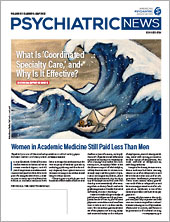During APA’s recent Legislative Representatives Forum, Shastri Swaminathan, M.D., past president of the Illinois Psychiatric Society (IPS), described an experience in which IPS urged psychiatrists to call their state legislators and oppose legislation allowing psychologists to prescribe medications.
Soon he received an angry call from someone in an Illinois politician’s office. “She was saying, ‘You guys really need to talk to each other and make up your mind, because before you, I had six other doctors call in support of psychologists prescribing,’ ” Swaminathan said. “And, of course, the doctors she heard from were all Ph.D.s—they were not psychiatrists.”
Swaminathan was not alone in his experience. Dozens of APA members participated in the Legislative Representatives Forum in March, and many had faced similar misunderstandings when advocating for safe-prescribing practices ("
APA Kicks Off New MH State Advocacy Forum"). During the forum, APA staff unveiled new resources to help district branches (DBs) throughout the country oppose legislation that would grant prescribing privileges to nonphysicians and instead focus on solutions to improve access to quality mental health care.
One of the new resources for DBs is the website
www.saferxprescribing.org. It provides information on the roles of different mental health professionals and emphasizes the importance of team-based models and telehealth as solutions to safely improve access to care. Additionally, APA has developed fact sheets and other tools customizable to each state. During the forum, participants also encouraged members to share advocacy techniques.
APA developed the new resources with McCabe Message Partners, a health care public relations firm. McCabe conducted polls and focus groups to determine what voters understand about the safe-prescribing debate. Frank Walsh, account director with McCabe, shared some major highlights. First, McCabe’s work showed that people are largely unaware of the differences between psychologists and psychiatrists, particularly regarding which professional has medical training. The respondents also stressed that training and remaining up to date on the latest research regarding medications are highly important when prescribing medication. McCabe also found that voters are aware that access to mental health care is a problem, pointing to collaboration among psychiatrists and other physicians as a key solution.
In a national survey of more than 1,000 respondents that McCabe conducted, 78% thought that only individuals with a medical degree and license to practice medicine should be allowed to prescribe psychiatric medications.
Staff from both APA and McCabe also held focus groups with APA members who have experience opposing psychologist-prescribing bills in their states. Debra Koss, M.D., immediate past president and chair of the Council on Advocacy of the New Jersey Psychiatric Association, was a member of one of those groups. Koss explained that, though the participants came from DBs of varying sizes, their advocacy experiences were very similar.
“We talked about a number of policy solutions that we are able to incorporate into our advocacy efforts that come from APA, including collaborative care, telepsychiatry, and workforce expansion,” Koss said. The conversations also focused on the importance of increasing access to physician-led, multidisciplinary care teams to ensure that patients have access to safe prescribing as part of their overall medical treatment.
In addition to
www.saferxprescribing.org, APA has developed resources that can be tailored to each individual state to aid DBs in their advocacy efforts. For more information contact Erin Berry Philp at
[email protected]. ■

